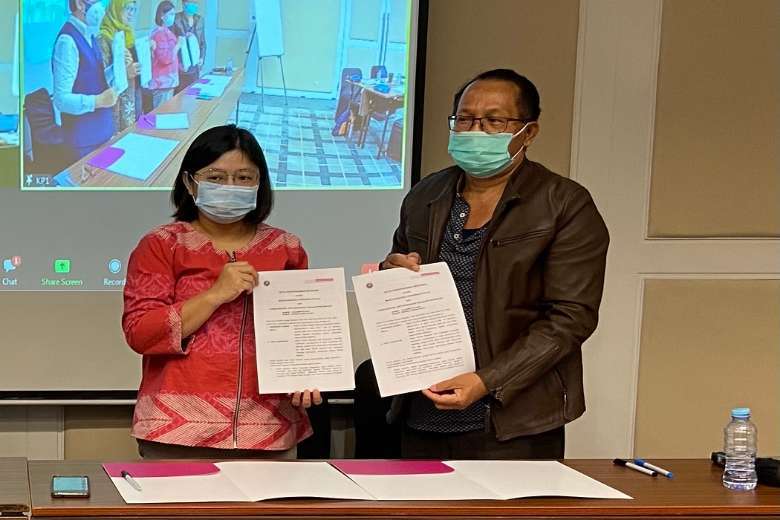(INDONESIA)
Union of Catholic Asian News (UCA News) [Hong Kong]
April 14, 2021
By Ryan Dagur
High-profile cases prompt educators, govt to team up to provide better protection for children from predators
A high-profile sexual abuse case in which altar boys in Depok on the outskirts of Jakarta were assaulted by a church worker was a wake-up call for Indonesia’s Catholic schools to look at ways to better protect students from such predators, according to educators.
The case — the first involving sexual abuse within the Indonesian Catholic Church brought to a civil court — saw the perpetrator, Syahril Marbun, jailed for 15 years for raping two altar boys.
“The case made us ask what can be done to ensure Catholic schools do not become places where such abuses occur,” said Franciscan Father Vinsensius Darmin Mbula, chairman of the National Council of Catholic Education, a coordinating forum for around 5,000 schools across the country.
Father Mbula said they did not have any official data on sexual harassment cases in Catholic schools.
“We have only heard rumors of cases which were supposedly resolved internally in each school,” he said.
However, the altar boy scandal, coupled with the universal Church’s commitment to addressing this issue, has prompted the council to begin drawing up protocols to tackle it. This is being done by studying documents published by the Vatican and the Indonesian Bishops’ Conference, the priest said.
Initial research into the matter revealed few Catholic schools have regulations that focused on child protection.
“Generally Catholic schools don’t take this as seriously as they should,” Father Mbula said.
The council’s move to draw up such regulations was further strengthened by a report of alleged sexual abuse by a teacher at a Catholic school in Jakarta at the end of last year, in which the victim wrote to the council to report the teacher.
The victim also wrote to the Jakarta Provincial Education Office and the Indonesian Child Protection Commission.

“When we visited the school, it turned out that there were no rules or procedures on handling sexual abuse,” Father Mbula said, adding that the case was currently being investigated by the police.
“It strengthened our commitment to making sure procedures and protocols are in place.”
To facilitate the process, the council is now working with the National Commission on Violence Against Women and signed a memorandum of understanding (MoU) on April 8.
It requires that the organizations work together in drafting the protocol, including sharing information regarding efforts to prevent sexual abuse and mentoring teachers and education staff.
At the signing, the commission also offered proposals concerning the prevention, handling and reporting of cases, as well as helping traumatized victims.
Andy Yentriyani, the commission’s chairwoman, said efforts to fight sexual abuse in schools “are not just addressing problems today.”
“The steps we take today will determine what happens in the future,” she said.
The impact of sexual abuse “is a physical and psychological matter that can affect the victim for the rest of their life.”
She welcomed the commitment made by the Catholic education council, as well as from other organizations such as the Christian Education Council and two major Muslim groups — Nahdatul Ulama and Muhammadiyah — which also wanted to work with them.
The MoU-signing event also saw workshops involving speakers from the Ministry of Education and Culture, the Ministry of Women’s Empowerment and Child Protection and groups that provide psychological assistance for women and children.
A senior Ministry of Education and Culture official who only goes by the name Jumeri said the ministry welcomed the commitment of religious organizations and said sexual abuse is one of three serious problems the government is seeking to address in Indonesia’s schools. The others are intolerance and bullying.
Retno Listyarti from the Indonesian Child Protection Commission said schools must provide “a safe space for children who have the courage to report sexual abuse.”
“Schools must open a complaint center and encourage children to seek help if they fall victim,” she said.
Otherwise, perpetrators will think they can get away with it and continue their crimes, she added.
She said that in 2019 they recorded 21 sexual abuse cases in schools, where the victims included 71 girls and 18 boys. “Of the perpetrators, 88 percent were teachers and 22 percent were school principals,” she said.
But this was only the tip of the iceberg “because many schools try to cover such crimes up to prevent them damaging a school’s image.”
Father Mbula said they want to have the protocols ready and launched on Dec. 10 this year to mark International Human Rights Day.
“They will be applied as a reference for formulating more practical rules in accordance with their respective contexts,” he said.
They will focus on prevention efforts, while for handling actual cases schools will work with various professional and relevant institutions.
“We can’t walk alone. Catholic schools will be open and cooperate with other Catholic institutions that are committed to tackling this issue,” he said.
They will also emphasize stronger cooperation between schools and families.
